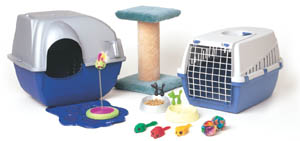Cat Care | Annual Wellness Exam
Congratulations on your new kitten!
You’ve got all the toys, bedding, and litter boxes and you’re ready to bring your new furry friend home. This adorable new member of the family will bring you much joy. You must now take on the job of ensuring your new cat’s longevity, happiness, and quality of life. This is done through good nutrition, loving attention, keeping a safe environment and regular checkups to your vet.
Spaying and Neutering
Many vets believe that spaying or neutering not only help solve the problem of overpopulation but also makes for more friendly, easier-to-live-with pets. Spayed female cats are more relaxed, playful and affectionate, while neutered males are calmer and less likely to “mark their territory”. Plus, spaying and neutering have health benefits – it minimizes the chances of breast cancer in female cats.
Your Kitten’s Basic Health Checks
- A thorough physical exam to set a state of physical health.
- Check for external parasites, such as fleas and ticks.
- Check for internal parasites, including tapeworms. Try to bring in a fresh stool sample for examination.
- First vaccinations and/or a discussion of the types of vaccinations your kitten needs and when they should be scheduled.
- Discussing spaying or neutering and possibly booking an appointment.
The first health check will give your vet the information they need to best advise you and your kitten’s about immediate diet and care. Plus, it will give them a knowledge base from which to base future checkups on. He will be able to better evaluate, monitor, and manage your cat’s health.
Home Sweet Home
With sensitive handling and friendly contact for at least an hour a day, your new kitty should soon become comfortable in their new home. If there are young children in the home, make sure they learn how to properly interact with the cat. Also, provide your pet with lots of opportunity for interesting, challenging play that will satisfy their natural instincts. Toys that encourage your cat to hunt or catch and scratching posts will help make your cat a joy to live with.

Your Cats Age
The best time to start looking after cat is right away. Starting off your cat with good nutrition, scheduled veterinary appointments, scheduled trips to the vet and a happy home sets the blueprints for a high quality of life for their whole life. Most cats are considered senior at 8 – 10 years old. Much like humans, time takes its toll on vital organs as your cat ages. Cats are more subtle to aging than dogs, as well as showing illness or pain. Pay attention to you cats behavior to detect problems early on.
- Check your cat’s mouth, eyes and ears regularly. Look for loose teeth, redness, swelling or discharge.
- Keep your pet’s sleeping area clean and warm.
- Make fresh water available at all times.
- Maintain a regime of proper nutrition and loving attention.
